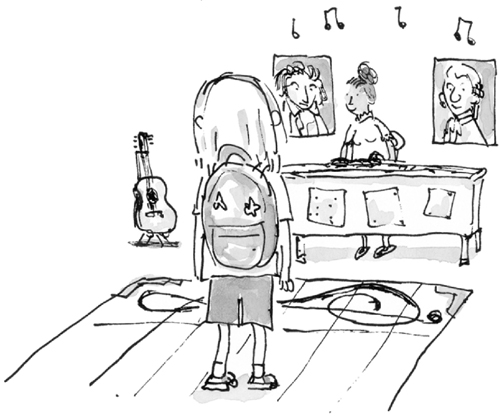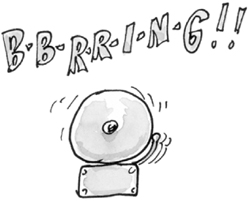
By the next morning, I’d decided for certain.
I’d quit the play that day.
My parents kept trying to talk me out of it.
“It’s such an honor to be cast,” my dad said.
And my mom said, “You’ll have
a wonderful experience.
I’m certain of it.”
But I said, “It’s my decision, right?”
And they both said, “Yes.”
So I threw my clothes on.
And they dropped me off at school early.
I wished they’d called Mrs. Quaid
to quit for me.
She won’t care, I kept saying to myself
as I walked down the hall to the music room.
I slowly passed bulletin boards
and cubbies
and trophy cases.
Until,
finally,
I reached the music room door.
I took a deep breath
and knocked.
“Come in,” Mrs. Quaid called.
She was sitting behind her desk, reading,
when I walked in.
She looked at me,
then held up her book for me to see.
“A Tale of Two Cities!” she said.
“I was just considering tweaks to our show.
Did you know the book ends with a beheading?”
“What’s a beheading?” I asked.
“When someone’s head gets chopped off,” she said.
“Very dramatic and moving.
But I don’t think Principal Nill would want us
chopping off heads.
Do you agree?”
I did agree.
But I wished I didn’t.
Because rolling heads were definitely better
than longing for Nicholas Rigby.
“I’m so glad you came in,” Mrs. Quaid said.
“I wanted to tell you something.
Our Mama Rabbit was originally a papa.
But you surprised me, Eleanor!
You have a terrific tone to your voice.
I don’t know how I missed it before.
I’d like to help you develop it
and show it off.”
“Uh …,” I said. “Thanks.”
I was glad she liked my tone.
But
I wondered,
did we have to develop it in the play?
Couldn’t we develop it in class?

Before I could ask that, Mrs. Quaid said,
“There’s one other thing I’m happy about.
The Mama Rabbit role requires maturity.
I know there’s lovey-dovey language in the play.
Not every fourth grader could handle that.
But I’m sure you can.”
“You are?” I said.
She nodded and said, “I am.”
Then she gave me a big smile.
“I’ve been going on and on,” she said.
“I almost forgot to ask—
why’d you stop by?”
“Uh …,” I said again,
trying to think.
I couldn’t exactly tell her
that I wasn’t mature enough
for lovey-dovey language.
I picked another problem.
“I don’t want to sing all alone onstage,” I said.
“Of course you don’t!” she said.
“You’re just like me,
when I was your age,
and so many other kids I’ve helped.
Don’t you worry.
I’m a stage fright pro.”

She waved that problem away with her hand.
And then the warning bell rang.
“Off to class you go!” Mrs. Quaid said.
“And no more worrying!”
So off to class I went.
But I didn’t stop worrying.
Because I could tell—
there would be no quitting now.
I was stuck in the show.